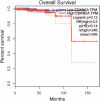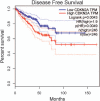Meta-analysis of CDKN2A methylation to find its role in prostate cancer development and progression, and also to find the effect of CDKN2A expression on disease-free survival (PRISMA)
- PMID: 29561434
- PMCID: PMC5895353
- DOI: 10.1097/MD.0000000000010182
Meta-analysis of CDKN2A methylation to find its role in prostate cancer development and progression, and also to find the effect of CDKN2A expression on disease-free survival (PRISMA)
Abstract
Background: Reduction of cyclin-dependent kinase inhibitor 2A (CDKN2A) (p16 and p14) expression through DNA methylation has been reported in prostate cancer (PCa). This meta-analysis was conducted to assess the difference of p16 and p14 methylation between PCa and different histological types of nonmalignant controls and the correlation of p16 or p14 methylation with clinicopathological features of PCa.
Methods: According to the preferred reporting items for systematic reviews and meta-analyses (PRISMA) statement criteria, articles were searched in PubMed, Embase, EBSCO, Wanfang, and CNKI databases. The strength of correlation was calculated by the pooled odds ratios (ORs) and their corresponding 95% confidence intervals (95% CIs). Trial sequential analysis (TSA) was used to estimate the required population information for significant results.
Results: A total of 20 studies published from 1997 to 2017 were identified in this meta-analysis, including 1140 PCa patients and 530 cases without cancer. Only p16 methylation in PCa was significantly higher than in benign prostatic lesions (OR = 4.72, P = .011), but had a similar level in PCa and adjacent tissues or high-grade prostatic intraepithelial neoplasias (HGPIN). TSA revealed that this analysis on p16 methylation is a false positive result in cancer versus benign prostatic lesions (the estimated required information size of 5116 participants). p16 methylation was not correlated with PCa in the urine and blood. Besides, p16 methylation was not linked to clinical stage, prostate-specific antigen (PSA) level, and Gleason score (GS) of patients with PCa. p14 methylation was not correlated with PCa in tissue and urine samples. No correlation was observed between p14 methylation and clinical stage or GS. CDKN2A mutation and copy number alteration were not associated with prognosis of PCa in overall survival and disease-free survival. CDKN2A expression was not correlated with the prognosis of PCa in overall survival (492 cases) (P > .1), while CDKN2A expression was significantly associated with a poor disease-free survival (P < .01).
Conclusion: CDKN2A methylation may not be significantly associated with the development, progression of PCa. Although CDKN2A expression had an unfavorable prognosis in disease-free survival. More studies are needed to confirm our results.
Conflict of interest statement
The authors have no funding and conflicts of interest to disclose.
Figures











References
-
- Torre LA, Bray F, Siegel RL, et al. Global cancer statistics, 2012. CA Cancer J Clin 2015;65:87–108. - PubMed
-
- Fossa SD, Nilssen Y, Kvale R, et al. Treatment and 5-year survival in patients with nonmetastatic prostate cancer: the Norwegian experience. Urology 2014;83:146–52. - PubMed
-
- Heidenreich A, Bastian PJ, Bellmunt J, et al. EAU guidelines on prostate cancer. part 1: screening, diagnosis, and local treatment with curative intent-update 2013. Eur Urol 2014;65:124–37. - PubMed
Publication types
MeSH terms
Substances
LinkOut - more resources
Full Text Sources
Other Literature Sources
Medical
Research Materials
Miscellaneous

